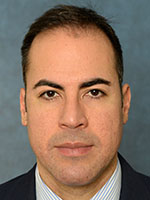Senior Reporter
Polly Trottenberg Shares Views on Trucking, Freight Policies

[Stay on top of transportation news: Get TTNews in your inbox.]
The Biden administration has proposed a $2.25 trillion infrastructure plan that aims to modernize the country’s mobility grids. Polly Trottenberg, nominee to become deputy secretary at the U.S. Department of Transportation, would join the Biden team’s effort if confirmed by the U.S. Senate. The chamber is expected to vote on her nomination as early as this week.
Responding to questions from senators, Trottenberg shared insight and perspective about freight and trucking policies.
Safety: “If confirmed, I will work with [the Federal Motor Carrier Safety Administration] to identify improvement opportunities to ensure the department effectively oversees the safe operations of the commercial trucking industry using the most appropriate policy tools. This could include better identifying high-risk new trucking companies, ensuring current regulations are judiciously enforced, expanding education and outreach, and harnessing new technologies that save lives.”

Mulero
Freight Plan: “I believe the department plays an important role in ensuring the U.S. has a freight transportation system which supports job creation, economic growth and global competitiveness, using all the department’s authorities, including discretionary grant programs like [Infrastructure for Rebuilding America]. I commit to working with Congress to support a multimodal freight program that achieves national economic and sustainability goals.”
COVID-19: “I agree that transportation workers are critical to providing essential passenger travel as well as supporting freight transportation throughout the U.S. and worldwide during the COVID-19 pandemic. These workers provide critical services such as transporting individuals to testing and vaccine sites, and ensuring other essential workers such as health care professionals have access to their workplaces.
Transportation workers also support the essential domestic and global supply chains by ensuring that medical supplies reach hospitals and health care facilities in a timely way. I am aware that the department supports the Centers for Disease Control and Prevention’s recommendation to support vaccinations for critical infrastructure workers, like those in the maritime, transit, aviation and other transportation industries. I commit to working with interagency partners, as well as state, local, tribal and territorial authorities, to promote expedient vaccination of transportation workers and to avoid potential supply chain disruptions.”
Highway Trust Fund: “Since 2008, the ongoing and growing imbalance between Highway Trust Fund spending and receipts has remained a significant issue. If confirmed, I will work with federal partners, the committee and with the other key committees to address our long-standing funding challenges.”
Cantwelll Questions for Trottenberg by Transport Topics on Scribd
Gas Tax: “My role is to advise the secretary on all aspects of transportation policy and advocate for the decisions he makes. I think it is important that as we transition to cleaner, sustainable and more efficient methods of transportation, we decide together how to best address that transition. This includes not only figuring out how to fund that transition, but also to make sure it occurs equitably so that rural and low-income Americans are not left behind. If confirmed, I will work with the secretary, our interagency partners, the committee and with the other key committees to address our long-standing funding challenges.”
Rural Corridors: “I understand that rural communities have unique needs, including resource challenges and extensive unmet maintenance. I also know that infrastructure investments are key to supporting economic growth and to ensuring that residents in rural communities have access to jobs, education access and essential basic services like health care. If confirmed, I will commit to making sure that eligible projects in rural areas receive their fair consideration for competitive discretionary grants.”
Autonomous Vehicles: “There are a number of areas where DOT can advance roadway safety, through [autonomous vehicle] technology and better vehicle designs that protect occupants as well as vulnerable roadway users, improving driver behavior, and addressing vehicle recalls with low completion rates. DOT can also work closely with state and local transportation agencies to promote safer roadway designs and use research, grants, data collections, performance standards, and other activities to advance national roadway safety.”
Highway Bill: “If confirmed, I commit to working closely with Secretary [Pete] Buttigieg, this committee, and with the other key committees on a bipartisan basis as Congress works to craft a multiyear reauthorization proposal that meets the needs of all communities, including rural communities.”
Green New Deal: “The transportation sector has a key role to play in addressing climate change, and if confirmed, I will continue to support the advancement of clean transportation technologies and will work with you and other stakeholders, including unions, industry, and local, state, tribal and territorial governments to determine how to create new programs and use existing programs to create innovative solutions to climate change. American innovation will indeed be critical to combating climate change and ensuring our global competitiveness.”
Workforce: “I know there are significant concerns about truck driver shortages, driver retention and an aging driver population at a time when our economy is increasingly dependent on freight movement by truck. If confirmed, [I] look forward to working with all the relevant stakeholders on this challenge, with a focus on safety and working conditions and how to best recruit, train and retain drivers.”
The Week Ahead (all times Eastern)
April 14, 10 a.m.: The Senate Environment and Public Works Committee meets for hearing on highway funding plans. Watch live here.
April 14, 11 a.m.: The House Transportation and Infrastructure Committee hosts a hearing for members of the chamber. Watch live here.
April 15, 2 p.m.: Secretary Buttigieg is scheduled to appear before the House Appropriations transportation subcommittee.
Freight Corridor
A timeless conundrum: What is infrastructure?
Legislative Docket

Smith
Legislation that would promote carbon capture and sequestration tax breaks recently was introduced by a group of U.S. senators. Last month, Sens. Shelley Moore Capito (R-W.Va.) and Tina Smith (D-Minn.) rolled out the “Carbon Capture Utilization and Storage Tax Credit Amendments Act,” which seeks to enhance a tax break known as the 45Q, which pertains to carbon capture.
“The United States has an opportunity to be a leader when it comes to carbon capture technologies, and this legislation will help us achieve that goal,” said Capito, ranking member of the Environment and Public Works Committee.
 Buzz
Buzz

With Congress aiming to consider updating the federal highway policy law known as the FAST Act, transit operators, road builders, bicyclists, the business sector, environmentalists and other stakeholders are calling for action.
Favorite Video
Once again: How a bill becomes a law.
Favorite Tweet
The beautiful game with Sen. Todd Young (R-Ind.).
I somehow convinced a 48-year-old US Senator to play soccer with me for a @thisisinsider piece.
You’ll never believe what happened next. https://t.co/EsI0d9bJ7d pic.twitter.com/D2lFF4cium — Adam Wren (@adamwren) April 5, 2021
The Last Word
Having a good internet connection is as important as having a good highway connection, maybe more so.
Transportation Secretary Pete Buttigieg on April 6.
We publish weekly when Congress is in session. E-mail emulero@ttnews.com with tips. Follow us @eugenemulero and @transporttopics.
Want more news? Listen to today's daily briefing below or go here for more info:



